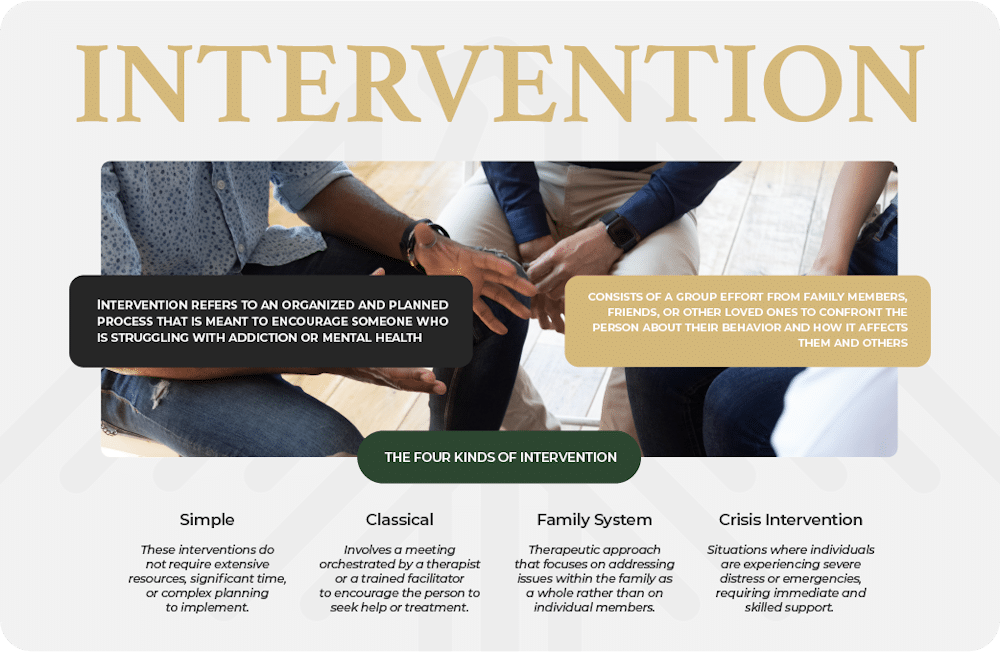Intervention Guide: How to Assist Your Loved One With Getting the Help They Need
Knowing someone you love suffers from addiction can be incredibly painful and heartbreaking. Moreover, figuring out what to do or how to help them can be challenging. In many cases, staging an intervention could be the last option. However, this kind of decision can be difficult, and your loved one may be resistant to it at first.
Most of the time, people with substance use disorders (SUD) refuse to admit they have a problem. They are highly resistant to deception and justification. Many addicts have great cognitive abilities and are skilled at hiding their symptoms from themselves and other people. As their friend or family member, it’s important to approach the situation with compassion and understanding. Remember that every person is different and every situation is unique. Careful planning plays a big role in staging an intervention.
At Eagle Creek Ranch Recovery, our drug rehab in Idaho, our effective intervention guide mainly explains the key steps you can take to help your loved one enter rehab. We also talk about the types and benefits of intervention, what happens during an intervention, when you should stage an intervention, and what to do if it fails. While it can sometimes be a daunting and frustrating process, the rewards of helping someone you care about overcome addiction and regain their health and happiness are immeasurable.
Intervention refers to an organized and planned process that is meant to encourage someone who is struggling with alcohol addiction, drug addiction, or other types of substance abuse to receive professional help and enroll in a rehabilitation program.
The intervention consists of a group effort from family members, friends, or other loved ones to confront the addict about their substance use and how it affects their relationships and quality of life. The intervention group may typically include a trained interventionist who can help facilitate the process and guide the conversation.
The ultimate objective of a rehab intervention is to convince the individual to acknowledge the seriousness of their addiction and allow them to participate in a recovery program where they may get the necessary medical, psychological, and emotional support to beat their substance use problem.
Interventions can be challenging and emotionally tough for both the person affected and their loved ones. Yet, if done properly, an intervention may aggressively and directly their addiction and start down the road to recovery.
The 4 Types of Interventions

Sometimes all it takes is one loved one to make a change, as opposed to staging a large gathering to confront an addicted relative. A simple intervention is quick and straightforward. It is an efficient approach to giving advice and support to people who might need more intense treatments. Some examples of simple interventions include motivational interviewing (MI), feedback and advice, referral to resources, and psychoeducation.
The classical model of intervention, sometimes referred to as the Johnson model, is a form of confrontational intervention in which a group of family members, friends, or other loved ones gathers to face the person with an addiction. It requires facing the person aggressively and directly and can be divisive. It is usually overseen by a trained interventionist, who directs the conversation and keeps the discussion focused. The classical intervention involves several key steps:
- Planning: The interventionist works with the family members or loved ones to plan the intervention, including who will be involved, where and when it will take place, and what will be said.
- Confrontation: During the intervention, the group confronts the individual about their addiction, expressing their concerns and emotions and providing specific examples of how the addiction has affected their lives.
- Treatment plan: The group provides the individual with a treatment plan, including options for rehabilitation programs and support.
- Consequences: The group may also outline consequences if the individual does not agree to seek help, such as ending financial support or cutting off communication.
Family system intervention is a therapeutic method that strives to resolve issues or concerns within a family. It is done by studying and treating the underlying family dynamics and communication patterns.
Family system intervention seeks to improve communication within families and how issues are handled. It is based on the idea that family members are connected and that problems or concerns within the family system can impact everyone.
Crisis intervention is a brief psychological intervention that seeks to offer immediate support for people going through severe suffering. Crisis intervention can be provided in various settings, including hospitals, emergency rooms, crisis hotlines, and community mental health centers. The objectives of this intervention are to stabilize the person, lower distress, and offer resources and help to address the underlying issues.
Typically, crisis intervention requires multiple important steps, such as
- Assessment: The crisis counselor or mental health expert evaluates the person’s situation to identify the severity of the crisis and the appropriate level of care.
- Stabilization: The counselor provides immediate support and assistance to stabilize the individual, reduce distress, and ensure their safety.
- Planning: Together with the client, the counselor creates and plans a strategy for resolving the underlying problems that contributed to the crisis.
- Referral to resources: The counselor may direct the client to useful resources, such as crisis hotlines, support groups, or mental health care.
Contact Eagle Creek Ranch
Recovery Today!
Why Wait? Find The Help You Need By Reaching Out To Us Today! Our Admissions Team Is Standing By.
The Top 5 Benefits of Intervention
Interventions for a person with a substance use disorder (SUD) or addiction can provide several benefits.
- Intervention helps encourage the addict to seek treatment. It allows them to see how serious their illness is and how it affects their loved ones. By doing so, they can be encouraged to get professional assistance and enroll in a treatment program. This is considered one of the biggest benefits of the intervention.
- Intervention can provide a safe and supportive environment for the addict to express their feelings and concerns.
- An intervention provides full support. It helps the addict in realizing that others share their struggle and are concerned about their welfare.
- Intervention improves family dynamics. Addiction can strain family connections and cause a lot of tension and conflict. Intervention can help improve communication and promote empathy and understanding among family members.
- Intervention helps reduce the risk of relapse. Individuals who enter rehab after an intervention are more likely to complete treatment and stay sober over the long term. It helps improve the individual’s overall health and well-being.
The Intervention Specialist
An “intervention specialist” is a skilled individual who focuses on supporting people struggling with various conditions. They are often involved in the planning, facilitating, referral of resources, and execution of interventions. They are the ones working with the family or support group to prepare for the intervention and facilitate the conversation.
Intervention specialists can be a valuable resource for individuals and families who are struggling with addiction or mental health concerns. They can provide guidance, support, and resources to help individuals get the help they need and begin the journey to recovery. However, an intervention specialist is costly.
Several sources claim that a professional interventionist can cost anywhere from $1,500 to $20,000, and insurance frequently does not cover the expense of interventions. On the other hand, if you agree to send your loved one to a certain treatment institution, some may provide professionals for free.
Finding the Right Intervention Specialist
Finding the right intervention specialist is an important part of planning a successful intervention. Here are some steps to help you find the right intervention specialist:
- Research: Start by doing some research to find intervention specialists in your area. Look for professionals who are licensed or certified in counseling, social work, or addiction treatment.
- Check qualifications: Once you have identified potential intervention specialists, check their qualifications and experience. Look for professionals who have experience working with individuals and families who are struggling with addiction or other issues.
- Check references: Ask for references and check them to get an idea of the professional’s reputation and track record.
- Meet with potential interventionists: Schedule meetings and discuss your situation and get a sense of their approach and style. This can help you find a professional who is a good fit for your needs.
- Consider the team: In addition to the intervention specialist, consider the other members of the intervention team. Look for individuals who are supportive and caring but also able to set boundaries and be firm when necessary.
- Discuss fees and logistics: Talk to the intervention specialist about fees and logistics, including how long the intervention will take, what resources will be needed, and what follow-up support will be provided.
- Trust your instincts: Finally, trust your instincts! Choose a team that you feel comfortable working with. An intervention specialist that you believe will be effective in helping your loved one.
Remember that finding the right intervention specialist is just one part of the process. It is important to work closely with your chosen specialist. This is to ensure that the intervention is well planned, will be executed effectively, and that your loved one will be provided with the support and resources they need to begin the journey to recovery.
When Should You Stage An Intervention?
Deciding when to stage an intervention can be a difficult and personal decision. It can vary depending on the situation and the individual involved. However, there are some general signs that an intervention may be appropriate, including:
- Serious consequences: The individual’s behavior is causing serious consequences for themselves or others, such as legal problems, financial difficulties, or relationship issues.
- Failed attempts at change: The individual has made previous attempts to change their behavior but has been unsuccessful.
- Resistance to treatment: The individual is resistant to seeking treatment or help for their problem.
- Deterioration of physical or mental health: The individual’s physical or mental health is deteriorating as a result of their behavior.
- Concerned family and friends: Family and friends are concerned about the individual’s well-being and feel that they need help.
If you are considering staging an intervention, it is ideal to consult with a professional, such as an intervention specialist. An intervention specialist can help provide an effective intervention guide to both the family members and the addict.
What Happens During An Intervention?
During an intervention, a group of family members, friends, or loved ones who care about the person struggling with addiction all come together. The purpose is to help the addict understand the dangers of addiction and persuade them to get treatment. Throughout the intervention, an interventionist may help to guide the conversation and keep the discussion on track.
Managing Expectations
While interventions can be successful in getting someone to seek help for their condition, there is always a chance that they won’t be. If the intervention does not provide the desired results, never give up! Yet, you should also establish boundaries and look out for your well-being. This can involve stepping back from the circumstance or putting limits on the support you offer.
In some cases, legal intervention may be required to ensure that the individual receives the exact help needed. This may involve seeking a court order for treatment or other legal action. The most important thing is to continue offering support and encouraging the individual to seek help when they are ready.
Receive the Help You Need at Eagle Creek
If you are concerned about a loved one who is struggling with addiction, it is important to take action. Consider staging an intervention right away! Received the help you need at Eagle Creek Ranch. Contact our team now!

Clinical Director
Kendall Maloof is the clinical director at Eagle Creek Ranch Recovery. She is a licensed marriage and family therapist and has held multiple leadership roles before settling here at Eagle Creek. Kendall received her master’s degree in marriage and family therapy from the Chicago School of Professional Psychology in 2016. Her career in mental and behavioral health began in 2014 when she took up internships in both the nonprofit and for profit sectors. She interned at multiple reputable companies, such as The Living Success Center and 449 Recovery in California.
In 2019, Kendall became the clinical director of Sunsets Recovery for Woman, a dual diagnosis program in southern California. Kendall is a natural leader. She has an incredible ability to problem solve and stay calm in any situation. Kendall never fails to show up when she is needed, and her calm demeanor makes her team and clients feel at ease. Eagle Creek Ranch Recovery is proud to have Kendall as our clinical director.




